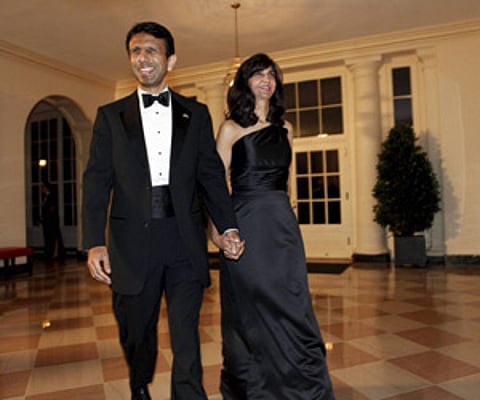

It’s the American Dream. Anyone can become President. Forty-year-old Bobby Jindal has come one step closer after he became Governor of Louisiana for a second time. The White House is not around the turn yet, but Jindal won 66 per cent of the vote; the highest victory percentage ever. The Republican firebrand bagged all the 64 parishes (counties are called parishes in this Bible belt state).
Jindal was born in Baton Rouge, Louisiana to Punjabi immigrants, Amar and Raj Jindal. Like Nikki Haley, the Indian American governor of North Carolina (another Bible belt state), Jindal converted to Christianity in his youth; Haley was a Sikh. Both have come under fire from Hindu groups in America for abandoning their religion to seek another faith; both have been accused of using their adopted faith to further their political ends. Aseem Shukla, co-founder of the Hindu-American Foundation, asked angrily, “The media storyline — ‘Haley and Jindal triumph despite questions about their faith’ — leaves millions of America’s adherents of Dharma faiths stone cold: What is so miserably wrong and unelectable in being a Hindu, Sikh, Buddhist or Jain?”
Jindal’s parents were deeply unhappy about his defection from Hinduism. Jindal explains: “My parents were infuriated by my conversion and have yet fully to forgive me. I tried to prepare myself for the worst; though I was ready when they ended their financial support, I was not as prepared for the emotional battles. My parents went through different phases of anger and disappointment. They blamed themselves for being bad parents, blamed me for being a bad son and blamed evangelists for spreading dissension. There were heated discussions, many of them invoking family loyalty and national identity. My parents have never truly accepted my conversion and still see my faith as a negative that overshadows my accomplishments. They were hurt and felt I was rejecting them by accepting Christianity. I long for the day when my parents understand, respect and possibly accept my faith. For now, I am satisfied that they accept me...”
Jindal was raised as any Hindu; weekly pujas, and Vedic scriptures were part of his upbringing. Jindal writes, “Hinduism provided me with moral guidance and spiritual comfort. It never occurred to me that I should consider any other religion; to be a Hindu was an aspect of my Indian identity.” But growing up in one of America’s predominantly white, Baptist southern states, an early exposure to evangelism was unavoidable. Along with it, perhaps the desire of an immigrant to belong. As a child, Jindal was shocked when a Baptist friend warned that his family is “going to hell” for being Hindus. It did not impress the young Jindal. But he says it prompted him to seek a deeper understanding of Hinduism. He delved into the Bhagavad Gita. “Although I found the stories fascinating and the writing magnificent, I was uncomfortable when Krishna convinced a reluctant Arjuna to secure his rightful inheritance by making war against his cousins. Though I did not like seeing a deity advocate violence, this feeling was not enough to reject an entire faith. I wanted to examine Hinduism on its own merits and doctrines,” he writes.
He began to read the Bible “to disprove the Christian faith I was learning both to admire and despise”. But it had the opposite effect. “I saw myself in many of the parables and felt as if the Bible had been written especially for me. But it certainly wrote his political script. In an article published before Louisiana went to the polls, Time magazine wrote, “A Catholic convert who grew up in a Hindu household, Jindal has made his name by aligning himself with the cultural conservative wing of the Republican Party, fiercely opposing stem cell research and abortion while favouring the teaching of Intelligent Design in public schools. The strategy has helped his standing among the state’s conservative Christian voters, and helped him overcome the twin liabilities (in some circles) of intellectualism and ethnicity — traits that arouse suspicion in some of Louisiana’s rural stretches, and that many say also helped tip the scales against him in 2003.”
America is not New York. Without the Bible vote, no politician stands
a chance of becoming President. It is the cross Bobby Jindal has to bear. Willingly.